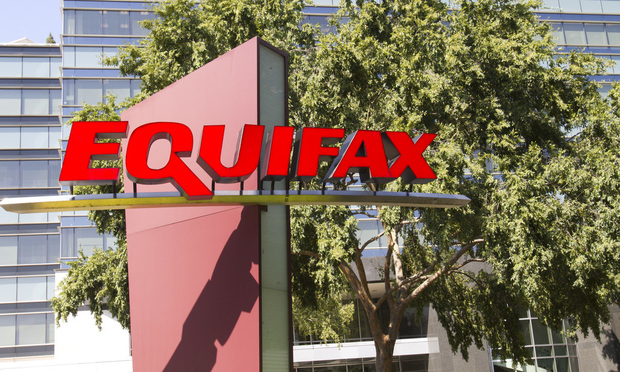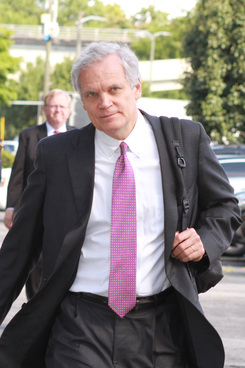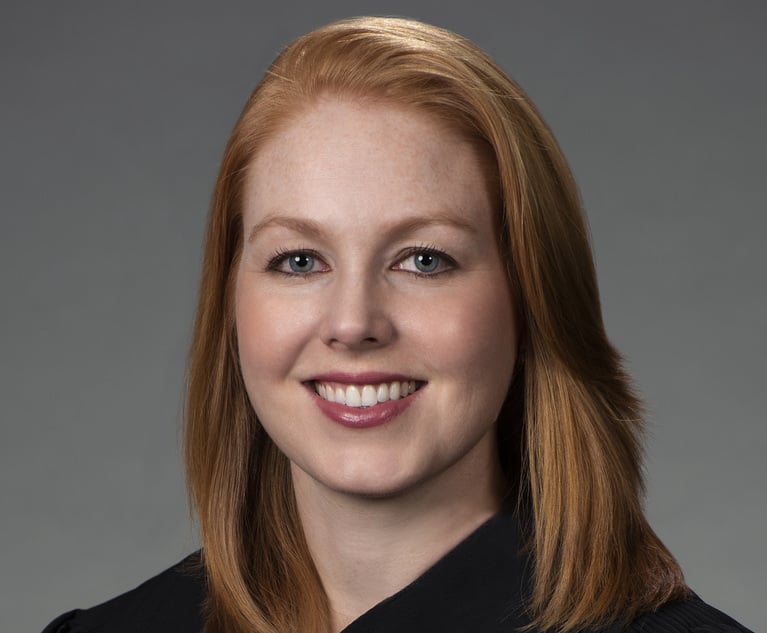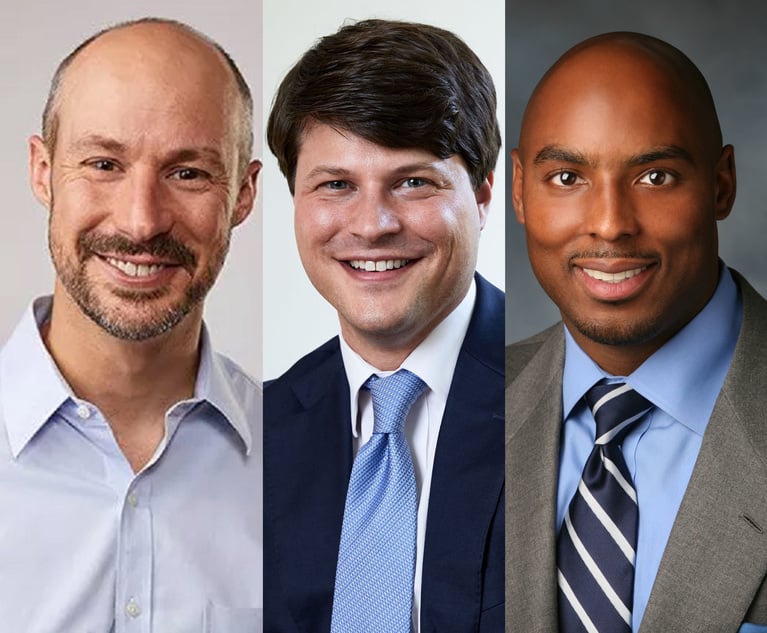Equifax Settlement Stalls as Objectors Fight With Class Counsel Over Sanctions, Bonds
A request for sanctions was filed after class counsel asked that objectors be required to file a $20,000 bond while their appeals are pending.
April 10, 2020 at 12:37 PM
7 minute read
 Equifax headquarters, Atlanta (Photo: John Disney/ALM)
Equifax headquarters, Atlanta (Photo: John Disney/ALM)
Stung after being labeled a serial objector for opposing the $1.4 billion Equifax data breach agreement, class action critic Theodore Frank has lashed out in a motion to sanction consumer class counsel and remove U.S. District Court Chief Judge Thomas Thrash from the case in the Northern District of Georgia.
Frank filed the April 6 sanctions motion in the U.S. Court of Appeals for the Eleventh Circuit in response to separate motions by the consumer class counsel to expedite five objectors' appeals and have them each ante up a $20,000 bond while their appeals are pending. Frank is litigation director of the Hamilton Lincoln Law Institute in Washington, D.C.
The March 30 bond request is part of a larger fight that lawyers representing a class of 147 million consumers are waging against a handful of individuals, including Frank, who were called "serial objectors" by Thrash in his January order approving the settlement and $77 million in legal fees for class lawyers.
Thrash held that the Equifax objectors "have unsuccessfully asserted many of the same or similar objections in other class action settlements, that their objections are not in the best interests of the class, that there is no substantial likelihood their objections will be successful on appeal and that the class would be best served by final resolution of their objections as soon as practicable so that class members can begin to benefit from the settlement."
Under the settlement terms, cash benefits cannot be paid, and credit monitoring, credit restoration and identity protection services remain on hold until the objectors' appeals are resolved. The settlement stems from a 2017 data breach at Equifax allegedly conducted by Chinese hackers.
 Kenneth Canfield of Doffermyre Shields Canfield & Knowles. (Photo: John Disney/ALM)
Kenneth Canfield of Doffermyre Shields Canfield & Knowles. (Photo: John Disney/ALM)Class counsel Ken Canfield of Atlanta's Doffermyre Shields Canfield & Knowles; Norman Siegal of Stueve Siegel Hanson in Kansas City, Missouri; and Amy Keller of DiCello Levitt Gutzler contended in a March 30 motion that delays caused by the objectors are an "attempt to leverage the appeal into a personal money-grab … to extract a payment in exchange for dismissal of their appeals so that the settlement funds can be distributed immediately."
The objectors should be required to post bond because the delay in distributing settlement benefits will result in "substantial costs" to consumers, the class lawyers contended.
Class lawyers also have asked the Eleventh Circuit to consolidate and expedite the objectors' appeals. But they said the objectors have refused to do so until the bond motion is dropped.
Frank on Thursday said he supports an expedited briefing "upon resolution of the appeal bond issue."
He also said consumer class lawyers were "making false factual allegations" against him and fellow objector David Watkins, "accusing us of extortion that we now have to respond to lest the court again adopts factual findings falsely accusing us of unethical behavior."
 Ted Frank, with the Center for Class Action Fairness.
Ted Frank, with the Center for Class Action Fairness.Frank said he and Watkins would each have to borrow $20,000 if Thrash grants the bond, "costing us thousands of dollars of interest expenses in the middle of a recession."
Canfield declined to comment.
Frank was represented prior to his appeal by Melissa Holyoak—the Hamilton Lincoln Law Institute's president and general counsel. He is now acting as Holyoak's co-counsel on behalf of himself and Watkins, a Utah resident and Holyoak's brother.
In his sanctions motion, Frank called the bond request "punitive," "abusive" and "harassing." He also asked the Eleventh Circuit to deny an expedited appeal and postpone setting a briefing schedule until the appeal bond motion is resolved.
Frank said neither he nor Watkins have ever "leverage[d] an appeal into a personal money-grab."
He claimed that Thrash's 122-page settlement order was "ghost-written by class counsel" and that the judge refused to put on the record alleged ex parte communications Frank said centered on the proposed order class lawyers submitted.
Frank said criticisms Thrash leveled at him in the final order were "duplicated" from class lawyers' briefs. "The refusal of the district court to place the ex parte communications on the record and instead keep them secret from appellate court review" constitute grounds for reversing the settlement agreement and reassigning the case to another judge, he said.
Frank's appellate sanctions motion rests on his claim that class lawyers intentionally misled the Eleventh Circuit over the objectors' willingness to set an expedited schedule for their appeals.
The motion for an expedited appeal stated that Frank, Watkins, and objector Mikell West, a Corpus Christi, Texas, lawyer, supported an expedited schedule, but only if the motion for bond was dropped, which class lawyers wouldn't do.
But Frank insisted that Watkins "never expressed any agreement, conditional or otherwise, with the proposed schedule, merely a willingness to discuss a schedule once the status of the appeal bond was known."
"Because plaintiffs deliberately misled this court and then refused to timely adequately withdraw and correct their misleading filing, sanctions are appropriate to deter plaintiffs' gamesmanship," he said.
But in a notice to the Eleventh Circuit, class lawyers cited emails from Holyoak saying she was "open to an expedited briefing schedule" and later, after they moved for bond, notifying them she would not agree to an expedited briefing schedule "now that we will be engaged in the collateral litigation over the improper appeal bond that you are seeking."
Holyoak also said she remained "open to discussing an expedited briefing schedule … once we know the status of the appeal bond."
In his sanctions motion, Frank insisted an expedited appeal also would be "burdened by the coronavirus crisis." He said Holyoak "has four children between the ages of six and 13 whose school is closed because of government social distancing policies. Her husband is a healthcare worker who works at a clinic and a hospital, and Ms. Holyoak is home alone home-schooling her children."
Frank was not alone in objecting to an appeal bond. So did Robert Clore, senior appellate counsel with the Bandas Law Firm in Corpus Christi, who represents objector Mikell West.
In court pleadings, Clore has sought to distance himself from his firm's founding partner, Christopher Bandas. In his settlement order, Thrash labeled Bandas a serial objector who has been denied pro hac vice admission to federal court in New Jersey and whose law firm has been permanently enjoined from engaging in any state or federal court proceedings in the state of Illinois.
In a March 31 email to Keller, Clore acknowledged that he initially agreed to "the notion of expedited briefing" but said he did so before the bond motion was filed. "If you withdraw that unfounded motion (which only serves to delay matters), then I am agreeable to your proposal," he said.
This content has been archived. It is available through our partners, LexisNexis® and Bloomberg Law.
To view this content, please continue to their sites.
Not a Lexis Subscriber?
Subscribe Now
Not a Bloomberg Law Subscriber?
Subscribe Now
NOT FOR REPRINT
© 2025 ALM Global, LLC, All Rights Reserved. Request academic re-use from www.copyright.com. All other uses, submit a request to [email protected]. For more information visit Asset & Logo Licensing.
You Might Like
View All
Justice Known for Asking 'Tough Questions' Resolves to Improve Civility
4 minute read

Alston & Bird Adds M&A, Private Equity Team From McDermott in New York
4 minute read
Veteran Federal Trade Law Enforcer Joins King & Spalding in Washington
4 minute readLaw Firms Mentioned
Trending Stories
Who Got The Work
J. Brugh Lower of Gibbons has entered an appearance for industrial equipment supplier Devco Corporation in a pending trademark infringement lawsuit. The suit, accusing the defendant of selling knock-off Graco products, was filed Dec. 18 in New Jersey District Court by Rivkin Radler on behalf of Graco Inc. and Graco Minnesota. The case, assigned to U.S. District Judge Zahid N. Quraishi, is 3:24-cv-11294, Graco Inc. et al v. Devco Corporation.
Who Got The Work
Rebecca Maller-Stein and Kent A. Yalowitz of Arnold & Porter Kaye Scholer have entered their appearances for Hanaco Venture Capital and its executives, Lior Prosor and David Frankel, in a pending securities lawsuit. The action, filed on Dec. 24 in New York Southern District Court by Zell, Aron & Co. on behalf of Goldeneye Advisors, accuses the defendants of negligently and fraudulently managing the plaintiff's $1 million investment. The case, assigned to U.S. District Judge Vernon S. Broderick, is 1:24-cv-09918, Goldeneye Advisors, LLC v. Hanaco Venture Capital, Ltd. et al.
Who Got The Work
Attorneys from A&O Shearman has stepped in as defense counsel for Toronto-Dominion Bank and other defendants in a pending securities class action. The suit, filed Dec. 11 in New York Southern District Court by Bleichmar Fonti & Auld, accuses the defendants of concealing the bank's 'pervasive' deficiencies in regards to its compliance with the Bank Secrecy Act and the quality of its anti-money laundering controls. The case, assigned to U.S. District Judge Arun Subramanian, is 1:24-cv-09445, Gonzalez v. The Toronto-Dominion Bank et al.
Who Got The Work
Crown Castle International, a Pennsylvania company providing shared communications infrastructure, has turned to Luke D. Wolf of Gordon Rees Scully Mansukhani to fend off a pending breach-of-contract lawsuit. The court action, filed Nov. 25 in Michigan Eastern District Court by Hooper Hathaway PC on behalf of The Town Residences LLC, accuses Crown Castle of failing to transfer approximately $30,000 in utility payments from T-Mobile in breach of a roof-top lease and assignment agreement. The case, assigned to U.S. District Judge Susan K. Declercq, is 2:24-cv-13131, The Town Residences LLC v. T-Mobile US, Inc. et al.
Who Got The Work
Wilfred P. Coronato and Daniel M. Schwartz of McCarter & English have stepped in as defense counsel to Electrolux Home Products Inc. in a pending product liability lawsuit. The court action, filed Nov. 26 in New York Eastern District Court by Poulos Lopiccolo PC and Nagel Rice LLP on behalf of David Stern, alleges that the defendant's refrigerators’ drawers and shelving repeatedly break and fall apart within months after purchase. The case, assigned to U.S. District Judge Joan M. Azrack, is 2:24-cv-08204, Stern v. Electrolux Home Products, Inc.
Featured Firms
Law Offices of Gary Martin Hays & Associates, P.C.
(470) 294-1674
Law Offices of Mark E. Salomone
(857) 444-6468
Smith & Hassler
(713) 739-1250






